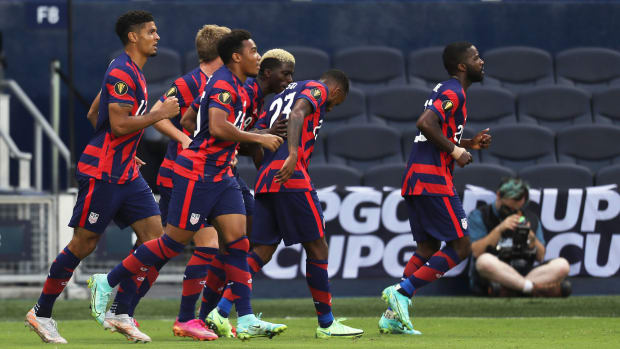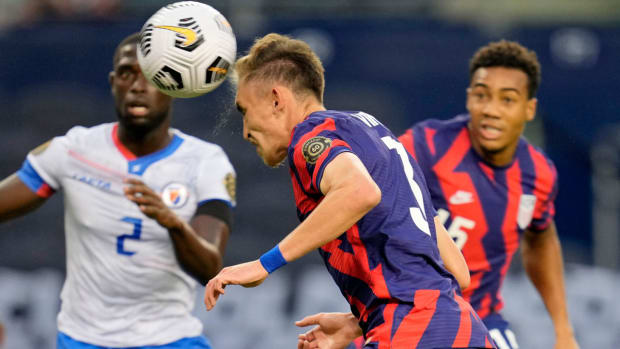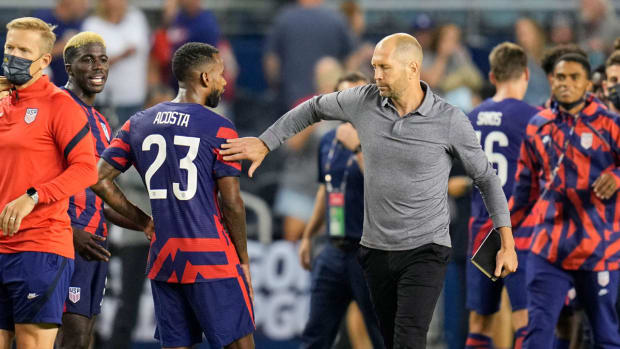A group markedly different than the one that won the Concacaf Nations League began its own trophy quest with a win over Haiti, though there's considerable room for growth.
It was a modest conclusion to a memorable weekend.
The night after Lionel Messi added to his legend in Brazil and hours after an Italian renaissance ended in glory at Wembley, a U.S. men’s national team missing nearly all its big-name players kicked off a Concacaf Gold Cup of ambiguous significance with an uneven 1–0 win over Haiti.
Concacaf’s biennial regional championship doesn’t have nearly the history or must-win cachet of its counterparts in South America, Europe and elsewhere. And this year’s edition is being contested under more mitigating circumstances than usual. It was pushed deeper into the summer by other competitions, and it’ll run up against the European club campaign and then the buildup to World Cup qualifying in September. So a lot of familiar names are missing.
For U.S. coach Gregg Berhalter, those factors reduced this Gold Cup from a “must-win” to a “try to win while addressing the bigger picture.” And so he named a 23-man team that features 19 MLS players, and which includes only four who were part of last month’s Nations League triumph. Lifting the Gold Cup would be great. But the bigger goal is preparing for the fall, whether that means resting certain key contributors or refining a roster that’ll have to handle those three-game World Cup windows.
It would be a slight surprise if this U.S. outfit had enough to win a seventh continental championship, especially considering Mexico’s more loaded squad (Saturday’s injury to Hirving Lozano notwithstanding). But the Americans should have enough to make a run, and they had just enough to defeat the Haitians at Sporting Kansas City’s Children’s Mercy Park in the group stage opener on Sunday.

The U.S. was far from dominant, but it was good enough inside the offensive and defensive penalty areas to earn the three points. The Americans (1-0-0) will continue the Gold Cup’s first round against Martinique (0-1-0) on Thursday evening. The Caribbean nation lost, 4–1, to Canada in their group-stage opener.
"It’s about being patient," Berhalter said after the win. "It’s about learning. It’s about gathering information on the players and the way we can play with this group and then adapting. It’s going to be a great experience to have to do that."
Haiti was playing under some challenging circumstances of its own. Whatever advantage Les Grenadiers might have enjoyed by being together for the recent Gold Cup qualifiers (the U.S. convened on Monday) was likely diminished by turmoil at home and coronavirus issues within the squad. While unrest in Haiti continues following last week’s assassination of president Jovenel Moïse—there was a moment of silence observed before the game—it emerged early Sunday that five players and an assistant coach were isolated following positive COVID-19 tests. Among them were forward Frantzdy Pierrot, the 26-year-old Guingamp striker who’s Haiti’s second-leading scorer, and starting center back Jems Geffrard.
Before that news broke, Berhalter acknowledged that Haiti almost surely would benefit from the additional time and games together. But he had faith in the experience and quality of his own squad, even if it didn’t feature the program’s biggest names.
“This has been a player pool that we’ve been working with for two years,” he said Saturday. “There’s only a couple guys that haven’t ever been involved with our program. So we hit the ground running.”
Berhalter did so with a lineup that was just about as experienced as he could make it, minus Matt Turner in goal (veteran Brad Guzan is a backup) and right back Shaq Moore starting in place of Reggie Cannon (hamstring). Otherwise, it was an XI peppered with players who Berhalter has come to know and trust, anchored by center back Walker Zimmerman, a midfield featuring Jackson Yueill, Kellyn Acosta and Sebastian Lletget and a front three led by Gyasi Zardes and Paul Arriola (who exited with an early hamstring issue).
Zimmerman hit the crossbar with a sixth-minute header but then helped lift the U.S. into the lead two minutes later. The Americans had tons of room in the right channel, and Zimmerman found Acosta there with a low, penetrating pass. The Colorado Rapids midfielder slipped the ball wide to Moore, whose cross was deflected and then popped into the air by Zardes. Left back Sam Vines was all alone at the left post to head the ball home. It was his first U.S. goal.

It looked like the rout may be on. But those recent friendly beatdowns of Concacaf foes aren’t indicative of how games tend to go once they get competitive. The Gold Cup can be a grind. Mexico learned that lesson in Saturday’s 0-0 draw with Trinidad & Tobago.
“I think we had a wake-up call when we got to Nations League for the guys to see the level of competition in Concacaf when there’s a prize on the line, and it will be very similar in the Gold Cup. The opening round is going to be difficult,” Berhalter warned last week.
Haiti made it difficult. It’s a fast, direct team that plays with intelligence and confidence when the ball turns over. There was far too much room in the U.S. midfield—and between the midfield and the back four—far too frequently. And Haiti exploited it just enough to knock the Americans off their rhythm and force them out of their attacking shape. Leading scorer Duckens Nazon and the Columbus Crew’s Derrick Etienne were threats, but the gutsy visitors lacked that last bit of quality required to make the U.S. pay. Etienne had what probably was Haiti's best chance, but he hit his 12-yard, first-half shot into the side netting.
"I missed the urgency to score more goals and to be dangerous and [to hit] the first pass forward and aggressive," Berhalter said about his team's inability to put Haiti away. "To me it was way too slow, way too backwards and not enough intent to turn Haiti around and get them defending in their penalty box. … From the attacking end, we were disappointed with the intent that we showed tonight."
Berhalter made a handful of changes in the second half, and local favorite Gianluca Busio, who entered for the struggling Yueill, hit a thumping long-range shot that forced a good save by the Haitian goalkeeper. Busio, 19, played like a candidate to start going forward. Acosta and Zimmerman looked relatively good as well, while Moore showed a spark on the right. Arriola’s replacement, Nicholas Gioacchini, hit the post in the 66th minute. But that shot, and Busio’s bid, came in isolation rather than as the result of sustained U.S. hegemony. The game was choppy, too wide open and far too close for U.S. comfort. But Gold Cups aren’t about comfort—especially this one.

This is a U.S. squad that features mostly support players, and so leaders, focal points and game-breakers will have to emerge. That’s what a Gold Cup group stage is for. For now, at least, it’s about grinding out results until the team settles in, chemistry improves and go-to players find their form.
"I feel like we still need to go to another gear," Berhalter admitted. "You could see we were a little rusty. The movements weren’t normally as clean as they normally were, and we didn’t create enough and we didn’t finish enough chances. From that standpoint, there’s room to improve. But happy with the shutout, happy that we didn’t give up a goal and happy to get the three points."
Coming into Sunday’s game, Haiti was one of only two Concacaf nations against which the U.S. didn’t have an all-time winning record (the other being Mexico, of course). The victory in Kansas City lifted the Americans to a 7-6-5 mark against Les Grenadiers, whose last win in the series came back in 1973.
More Gold Cup Coverage: